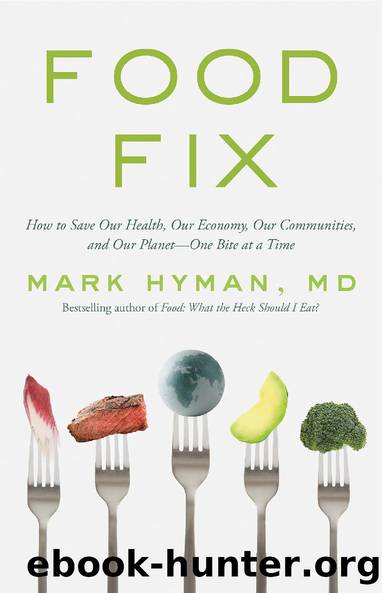Food Fix: How to Save Our Health, Our Economy, Our Communities, and Our Planet One Bite at a Time by Mark Hyman

Author:Mark Hyman
Language: eng
Format: epub, mobi
Tags: Health & Fitness, Diet & Nutrition, Nutrition, Diets, Social Science, Agriculture & Food, Political Science, Public Policy, Agriculture & Food Policy
ISBN: 9780316453158
Publisher: Little, Brown
Published: 2020-02-25T00:00:00+00:00
BIG FOODâS MAFIA TACTICS: CORPORATE CO-OPTING AND MANIPULATION
While establishing links to minority groups is particularly insidious, the food industry uses corporate sponsorships and financial gifts to buy loyalty from a wide range of prominent organizations. In a report by the Center for Science in the Public Interest, called âSelfish Giving: How the Soda Industry Uses Philanthropy to Sweeten Its Profits,â6 these nefarious tactics are extensively documented. Hereâs their strategy:
â Link their brands to health and wellness rather than illness and obesity
â Create partnerships with respected health and minority groups to win allies, silence potential critics, and influence public health policy decisions
â Garner public trust and goodwill to increase brand awareness and brand loyalty
â Court growing minority populations to increase sales and profits
This strategy of investing in âcorporate social responsibilityâ can make strange bedfellows, but it achieves two important objectives for the food industry. It can generate outspoken support, as we saw with the NAACP and the Hispanic Federation, and it can buy silence from groups that might otherwise criticize junk-food companies for their most shameful behaviors.
The seduction of soda money has created chilling conflicts for many influential organizations. We already saw in Chapter 4 how Big Food fights back against soda taxes; their tactics also include corrupting health groups. Save the Children, an international nonprofit that has long fought for childrenâs rights, was once an outspoken proponent of soda taxes. The nonprofit group threw its endorsement behind soda tax campaigns in New Mexico, Philadelphia, Washington State, Mississippi, and Washington, DC. But in 2010, to the surprise of many in the public health world, Save the Children suddenly withdrew its support for soda taxes. It was perhaps no coincidence that around the same time the organization accepted a $5 million grant from Pepsi.7 The following year it received $50,000 from Coke.
Sadly, Save the Children was not alone. When Mayor Michael Nutter of Philadelphia proposed a soda tax in 2010, the soda industry offered to make a hefty donation to the city if it would agree to abandon the measure. Eager to receive a windfall, the city council voted down the tax, and the American Beverage Association followed through with a $10 million donationâsome might call it a bribeâto the Childrenâs Hospital of Philadelphia for an obesity program.8 Fortunately, years later, the tax passed on both diet and regular sugar-sweetened beverages. The reason the soda companies so aggressively opposed it is because taxes work. In Philadelphia after the tax, the odds of daily consumption of regular soda was 40 percent lower, energy drinks 64 percent lower, and bottled water 58 percent higher, and the thirty-day regular soda consumption frequency was 38 percent lower.9 In a follow-up study of the 1.5 cents-per-ounce tax there was a 51 percent reduction in sugar-sweetened-beverage consumption, or 1.3 billion ounces less, over two years.10 However, the American Beverage Association has spent millions fighting back against this tax, trying to get it repealed, and has even taken the city to court. The judge ruled in favor of the
Download
Food Fix: How to Save Our Health, Our Economy, Our Communities, and Our Planet One Bite at a Time by Mark Hyman.mobi
This site does not store any files on its server. We only index and link to content provided by other sites. Please contact the content providers to delete copyright contents if any and email us, we'll remove relevant links or contents immediately.
Machine Learning at Scale with H2O by Gregory Keys | David Whiting(4293)
Never by Ken Follett(3937)
Fairy Tale by Stephen King(3370)
Will by Will Smith(2911)
Hooked: A Dark, Contemporary Romance (Never After Series) by Emily McIntire(2550)
The Dawn of Everything: A New History of Humanity by David Graeber & David Wengrow(2197)
The Becoming by Nora Roberts(2188)
A Short History of War by Jeremy Black(1842)
The Strength In Our Scars by Bianca Sparacino(1841)
HBR's 10 Must Reads 2022 by Harvard Business Review(1839)
Go Tell the Bees That I Am Gone by Diana Gabaldon(1754)
A Game of Thrones (The Illustrated Edition) by George R. R. Martin(1722)
515945210 by Unknown(1660)
Bewilderment by Richard Powers(1609)
443319537 by Unknown(1545)
The 1619 Project by Unknown(1458)
The Real Anthony Fauci: Bill Gates, Big Pharma, and the Global War on Democracy and Public Health (Childrenâs Health Defense) by Robert F. Kennedy(1398)
How to Live by Derek Sivers(1352)
I Will Find You by Harlan Coben(1338)
